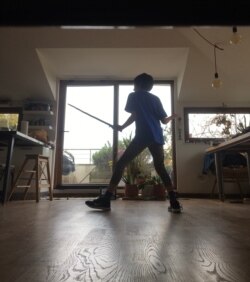COVID-19 came late to Turkey, compared to its European neighbors, but the reality of the threat is increasingly impacting life -- and with it fears that we are in it for the long term.
Turks are accustomed to living through turbulence and, invariably adapt quickly to change. Dramatic change soon becomes the norm, and life moves on -- a habit I too have picked up after decades living in Istanbul.
There is no compulsory curfew for people over 20 and under 65. But outside life has more or less come to an end, other than the welcome shopping trip or a quick stroll.
Walking around once-bustling streets and formerly busy restaurants, I try to remind myself how it once was. It seems now a forgotten time, as this has become the new reality.
The web savviness of the country's food providers is facilitating its transition into this new reality. Whether it's supermarkets or far-away organic farmers, all send welcome food packages, ordered online and swiftly delivered by the country's extensive courier services.
Deliveries are made within days or a week at the latest. This is a stark contrast from the experiences of my friends across Europe, who say two weeks’ delivery time is "good" for anything ordered online.
Sending food by courier is nothing new, here. My Turkish wife's parents, like so many others, often send local delicacies from their home on the Black Sea.
My 12-year-old son Mir has been the quickest among us to adapt to life at home. Online classes start at 10 am, ending at 4 pm. For him, homeschooling means no longer rising with the dawn chorus to catch his school bus. Instead, a more leisurely rise at 9 am has become the order of the day. That, I have to say, is welcomed by all the family.
Mir also says doing classes in pajamas is much more fun, although the school is now insisting that all children must wear uniforms at least one day a week. "Why, why, why?” Mir demands, and all I say is, "It is what it is."
Mir plays with his friends online with the shoot-em-up Fortnite. I am now used to hearing him screaming to his friends, with a mixture of reprimands and congratulations.
Even his fencing classes continue online, with Mir waving his wooden sword as directed and with relentless training -- another new norm for home.
Turkey has a well-developed and relatively inexpensive internet along with widespread smartphone use, something which is undoubtedly helping the country get through the epidemic.
But the smooth transition into social isolation hit a wall earlier this month with the chaotic imposition of a weekend curfew in all of Turkey's main cities.
The curfew, announced only two hours before it was imposed at midnight, provoked chaos. For us, we discovered too late that we had no salt or milk at home, as our local grocer, or "bakkal" as it is called in Turkish, was shut.
Across Istanbul, images of people queuing to buy food, desperately trying to beat the midnight deadline, circulated on social media. The experience appears to have instilled a deep unease in the country.
Since that weekend of chaos, Istanbul feels far more foreboding. Online deliveries from supermarkets appear to be no longer working. Numerous attempts to order are met with the message "delivery time unavailable." The online service seems overwhelmed by demand as people seem now to be stocking up for a future with more prolonged curfews.
I recently interviewed a man who told me with exasperation that a quick trip to the supermarket had ended up lasting three hours. "I went early thinking it would be empty, but it was packed, I never saw anything like it," he said.
Ramadan starts later this month, and there is gossip that a full-scale lockdown could be enforced in Turkey's main cities for the four weeks of fasting.
The Health Ministry daily briefing exudes confidence that everything is under control, despite Turkey rapidly moving up the world league table of infections.
The government claims that within weeks, the virus will be tamed and the country can start to return to normal. But at the same time, emergency hospitals are being built in Turkey's principal cities.
For now, returning to normal, when Istanbul streets are full and the vibrancy of the city rings with a deafening cacophony, still seems far away.
Now there is silence, and I am looking at my small terrace and asking myself, should I dig up some of my flowers and plants and start growing potatoes and other vegetables and fruits?
But first, I need to dash to the shops before another weekend curfew.







